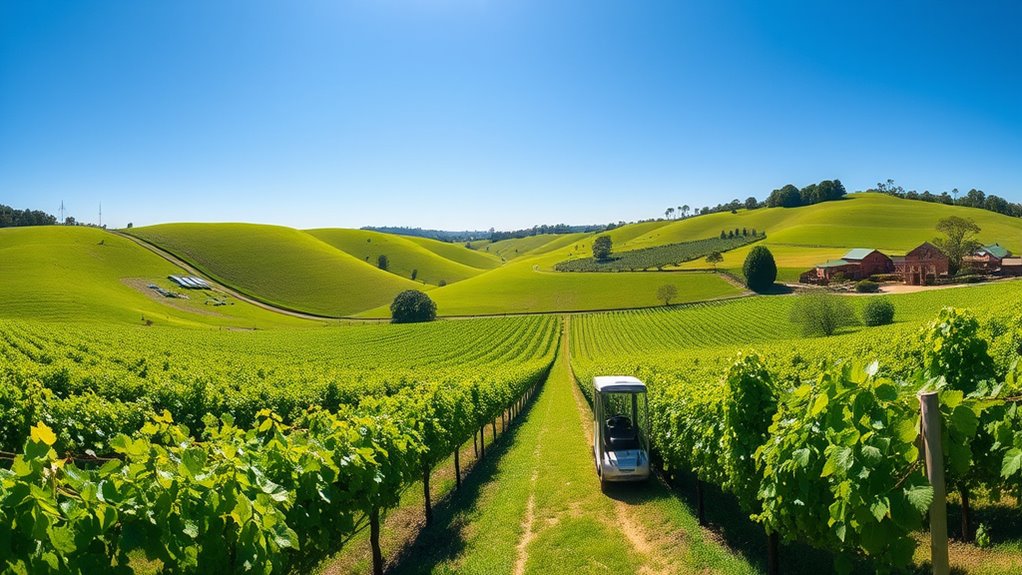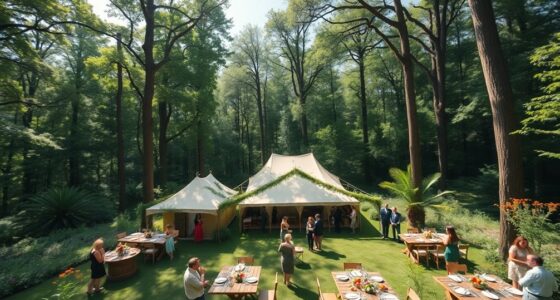To enjoy sustainable wine touring in South Australia’s Barossa Valley, choose eco-certified vineyards practicing organic farming and water conservation. Use electric bikes or shuttles to explore the region with a low carbon footprint. Support local organic eateries, and bring reusable bottles to cut waste. Practice responsible tastings and consider vineyard conservation initiatives that protect native species. Keep your visit eco-friendly by planning a low-impact itinerary—there’s more to discover for sustainable wine lovers.
Key Takeaways
- Support vineyards with eco certifications focused on water conservation, organic farming, and renewable energy for sustainable practices.
- Use electric vehicles, bikes, or public transit to reduce transportation-related carbon emissions during vineyard visits.
- Choose local, organic foods and bring reusable containers to minimize waste and promote eco-friendly dining.
- Participate in responsible tasting and conservation efforts that protect native species and promote biodiversity.
- Visit wineries implementing renewable energy, sustainable farming, and waste reduction initiatives to support eco-friendly wine production.
Choosing Eco-Conscious Vineyards
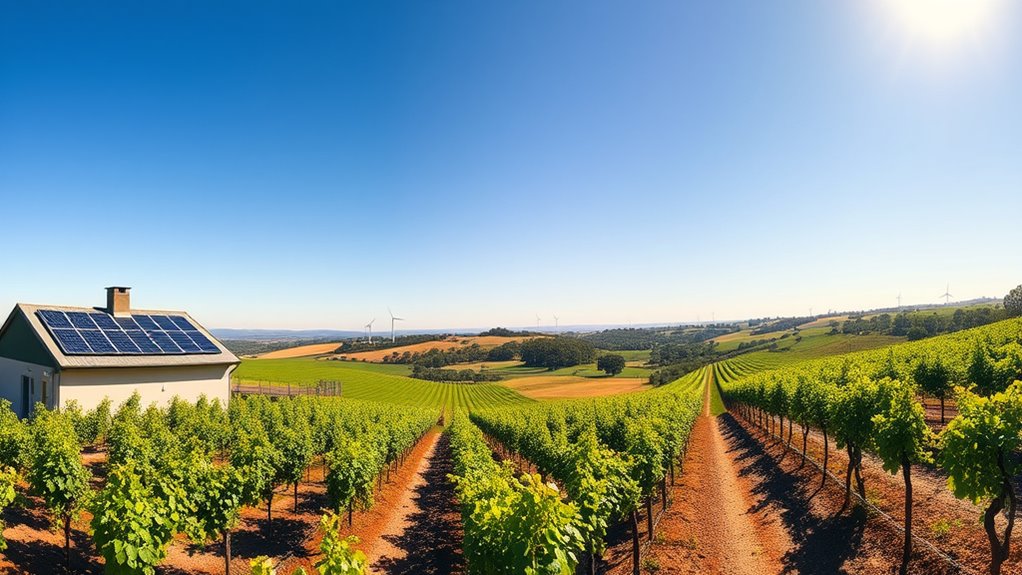
When selecting vineyards to visit in the Barossa Valley, opting for eco-conscious wineries can make your tour more sustainable and impactful. Look for vineyards with recognized vineyard certification, which guarantees they meet strict environmental standards. These certifications often come from eco label programs that promote sustainable practices such as water conservation, organic farming, and reduced chemical use. Wineries with such credentials demonstrate their commitment to protecting the land, water, and local ecosystems. Choosing certified vineyards supports businesses that prioritize eco-friendly methods, helping to reduce your carbon footprint. Additionally, these vineyards often provide transparent information about their sustainability efforts, making it easier for you to make mindful choices. Implementing sustainable farming techniques can further enhance the positive environmental impact of your visit. For example, some wineries incorporate renewable energy sources into their operations to further lessen their environmental footprint. Embracing climate-conscious practices can also help mitigate global warming effects and promote long-term vineyard health. Staying informed about sustainable initiatives can inspire you to support innovative solutions within the wine industry. By selecting eco-certified wineries, you contribute to a greener, healthier Barossa Valley.
Opting for Sustainable Transportation Options

Choosing sustainable transportation options is a key way to minimize your environmental impact while exploring the Barossa Valley. Opt for electric vehicles if you rent a car—they produce zero emissions and are increasingly available locally. Alternatively, consider using public transit, such as local buses or shuttle services, which reduce carbon footprints and alleviate traffic congestion. Many wineries and tour operators now offer eco-friendly transportation options, making it easy to travel responsibly. Biking is another excellent choice; the scenic countryside invites you to explore on two wheels, with bike rentals readily available. Additionally, using eco-friendly transportation options like electric bikes and shared shuttles can further reduce your carbon footprint during your visit. Incorporating Mazda Tuning principles such as suspension tuning and efficient engines can help enhance your vehicle’s eco-performance and contribute to a greener journey. Furthermore, supporting low-impact travel initiatives encourages more sustainable tourism practices in the region. Utilizing alternative transportation modes can significantly reduce environmental impact and promote conservation efforts while enjoying your tour. Using organic and natural juices as a healthy refreshment can help you stay energized during your tour. By selecting these sustainable options, you not only protect the region’s natural beauty but also support efforts to make wine touring more eco-conscious and enjoyable for everyone.
Supporting Local and Organic Food Producers
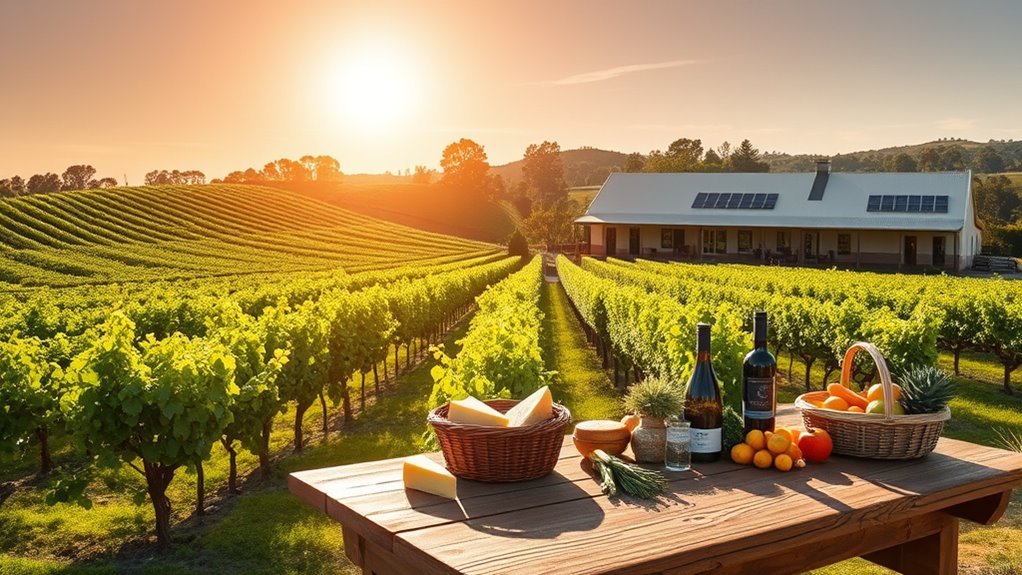
Supporting local and organic food producers means you can enjoy fresh, sustainably farmed ingredients that enhance your wine experience. Many nearby farms use organic practices, ensuring healthier soil and better flavors. Pairing these foods with local wines creates a memorable and authentic tasting journey.
Organic Farming Practices
Organic farming practices have become a crucial part of the Barossa Valley’s commitment to sustainability and quality. By prioritizing soil health, farmers avoid synthetic chemicals that can degrade land over time. Instead, they focus on natural amendments and cover cropping to maintain fertile, resilient soil. Crop rotation plays a vital role, preventing pest buildup and reducing the need for chemical interventions. This method helps break pest and disease cycles, promoting healthier vines and fruit. Additionally, embracing failure in experimentation encourages farmers to refine their techniques and adopt innovative approaches to organic cultivation. As a visitor, you’ll notice vineyards embracing these techniques, which contribute to vibrant flavors and a lower environmental impact. Organic practices not only support local ecosystems but also guarantee that the wine you enjoy is crafted with respect for the land and future generations. Additionally, soil health management is essential for maintaining the long-term sustainability of organic vineyards, ensuring the land remains productive for years to come. Implementing integrated pest management strategies further minimizes chemical use while protecting crop health.
Local Food Pairings
As you explore the Barossa Valley, you’ll find that pairing local wines with regional foods enhances the tasting experience and supports nearby producers. Using food pairing techniques that match wine flavor profiles with local ingredients creates harmony on your plate. For instance, rich reds like Shiraz complement hearty, grilled meats, while crisp whites pair beautifully with fresh seafood or light salads. By focusing on regional specialties—such as artisanal cheeses, olives, and seasonal vegetables—you elevate your wine tasting and support organic farmers. Paying attention to acidity, tannins, and sweetness helps you choose pairings that highlight the wine’s character. Additionally, incorporating local ingredients like collagen and hyaluronic acid into your diet can improve skin hydration and overall health, which complements the rejuvenating experience of savoring local wines. This sustainable approach not only deepens your appreciation of the flavors but also promotes the local, organic food movement thriving in the valley. Understanding the divorce process in various states can also inspire you to plan your journey smoothly, whether you’re exploring South Australia’s wineries or preparing for a new chapter in life. Incorporating dog-friendly options and environments can enhance your experience if you’re traveling with pets, ensuring everyone enjoys the journey.
Engaging in Responsible Tasting Experiences
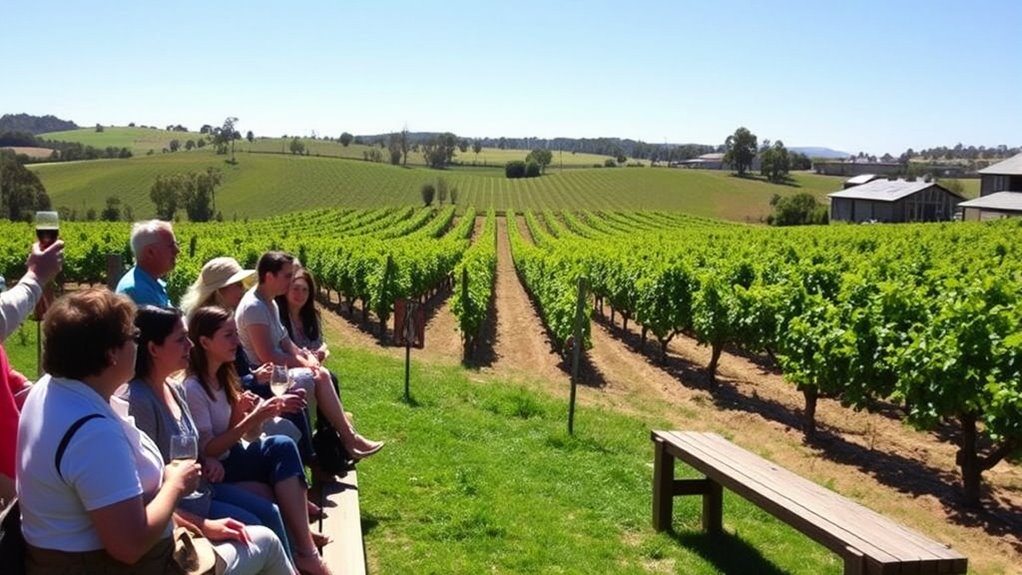
When enjoying tastings in the Barossa Valley, it’s vital to prioritize responsible drinking to guarantee a memorable and safe experience. Pace yourself during wine tasting and vineyard tours, savoring each sip without overdoing it. Stay hydrated and eat beforehand to prevent intoxication. Remember, moderation enhances your enjoyment and supports sustainable practices. To help you stay mindful, here’s a quick guide:
| Tip | Why it Matters | How to Practice |
|---|---|---|
| Limit tastings | Prevent overconsumption | Take breaks between tastings |
| Stay hydrated | Avoid dehydration | Drink water alongside wine |
| Eat well before tasting | Reduce intoxication risk | Have a hearty meal beforehand |
| Use designated drivers | guarantee safety | Arrange transportation in advance |
| Be respectful of staff | Support responsible vineyard visits | Follow guidelines and ask questions |
Additionally, understanding how to protect your skin during outdoor activities can help prevent skin damage and support overall health.
Participating in Vineyard Conservation Initiatives

By participating in vineyard conservation initiatives, you can help support local biodiversity and protect native species. Many wineries adopt eco-friendly practices and promote sustainable farming methods to reduce environmental impact. Your involvement makes a difference in preserving the valley’s natural beauty for future generations.
Supporting Local Biodiversity
Supporting local biodiversity is vital for maintaining the health and resilience of vineyard ecosystems in the Barossa Valley. Participating in initiatives like creating wildlife corridors helps connect fragmented habitats, allowing native animals to thrive and move safely across the landscape. These corridors support pollinators and natural pest control, reducing the need for chemical interventions. Additionally, native plant conservation plays a key role by preserving local flora that supports diverse wildlife and maintains soil health. When you engage in vineyard conservation efforts, you help protect the region’s unique species and promote a balanced ecosystem. Your involvement ensures that the vineyard landscape remains vibrant, resilient, and sustainable for future generations to enjoy and explore.
Implementing Eco-Friendly Practices
Participating in vineyard conservation initiatives allows you to directly implement eco-friendly practices that benefit the environment. By investing in solar energy systems, you reduce reliance on fossil fuels and lower your carbon footprint. Many vineyards pursue green certifications, which recognize sustainable practices like water conservation, waste reduction, and soil health management. These certifications not only demonstrate your commitment to sustainability but also attract eco-conscious visitors. Incorporating renewable energy sources and adhering to certified standards helps you operate more sustainably while preserving the land for future generations. Taking these steps shows your dedication to environmental stewardship, enhancing your reputation and supporting the overall health of the Barossa Valley ecosystem. Eco-friendly practices become an integral part of your vineyard’s identity and long-term success.
Promoting Sustainable Farming
Engaging in vineyard conservation initiatives is essential for promoting sustainable farming practices that safeguard the land and ensure the long-term health of your vineyard. Participating in these initiatives helps you implement efficient vineyard irrigation, reducing water waste and preserving resources. It also supports integrated pest management, minimizing chemical use and protecting the environment. To contribute effectively, consider these actions:
- Adopt drip irrigation systems for precise water delivery
- Use natural pest control methods to decrease reliance on chemicals
- Restore native vegetation to enhance biodiversity and soil health
Reducing Waste and Minimizing Plastic Use
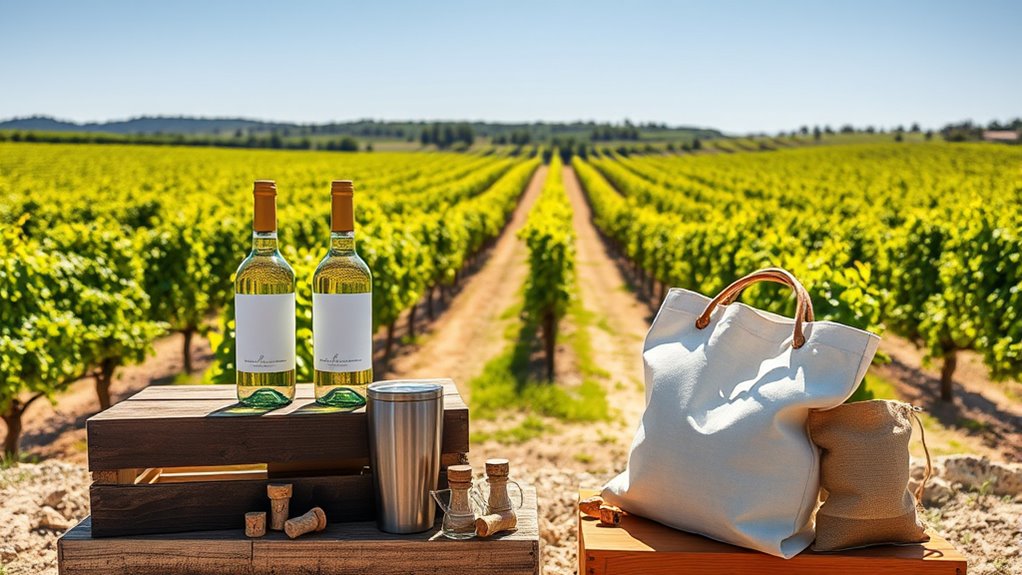
To make a meaningful impact on the environment while exploring South Australia’s renowned wineries, you can actively reduce waste and minimize plastic use during your visit. Bring along reusable wine bottles to refill instead of purchasing new bottles, cutting down on single-use plastics. Many wineries now offer refilling stations or encourage customers to bring their own containers. Additionally, consider wineries that practice composting wine barrels, turning what would be waste into valuable compost for vineyards or gardens. Avoid disposable cups, straws, and plastic packaging whenever possible. Carry a reusable tote for purchases, and opt for eco-friendly packaging options. Small changes like these can considerably reduce your plastic footprint and support sustainable practices in the region.
Planning a Low-Impact Itinerary
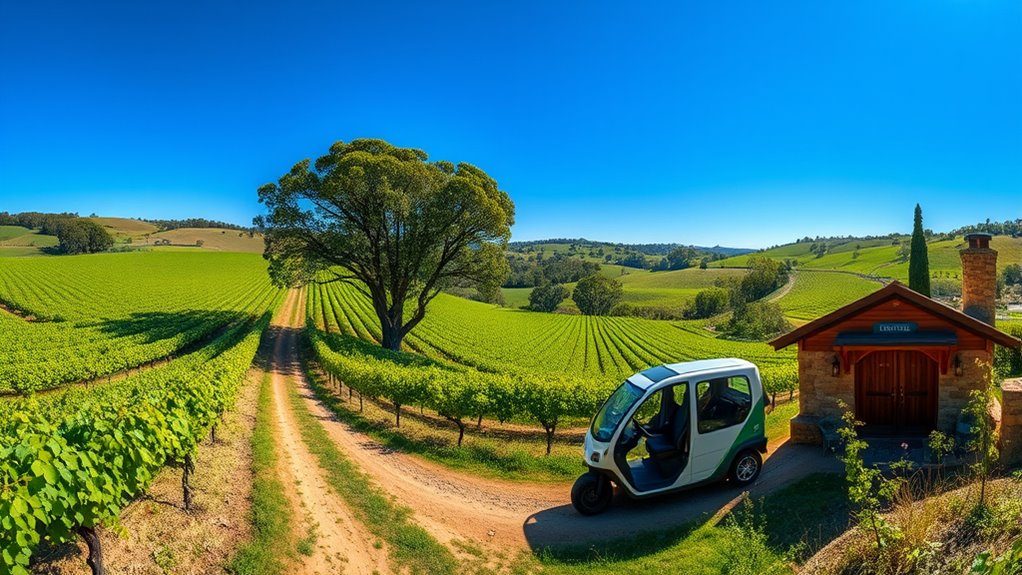
Creating a low-impact itinerary for your wine tour involves thoughtful planning to minimize environmental footprint while enjoying the region’s beauty. Focus on visiting wineries that prioritize sustainable practices, including eco-friendly cellar techniques and natural wine aging processes. To reduce your carbon footprint, consider guided tours that use electric vehicles or bike rentals. Planning your visits ahead helps avoid unnecessary travel and overlapping routes.
Here are some ideas:
- Schedule visits to wineries practicing sustainable cellar techniques and natural wine aging.
- Opt for shared transportation or bike tours to cut emissions.
- Combine tastings with educational sessions on wine aging and eco-friendly production methods.
Frequently Asked Questions
How Can Travelers Assess a Vineyard’s Sustainability Commitments?
When evaluating a vineyard’s sustainability commitments, you should look for clear indicators of vineyard sustainability efforts. Check if they have an eco label verification, which confirms their adherence to eco-friendly practices. Research their sustainability policies, ask about organic or biodynamic farming, and observe their environmental initiatives. These steps help you guarantee you’re supporting vineyards that genuinely prioritize eco-conscious methods, making your wine tour both enjoyable and environmentally responsible.
Are There Eco-Friendly Accommodations Available in the Barossa Valley?
You’ll find eco-friendly accommodations in the Barossa Valley that prioritize sustainability. Many lodges and inns embrace organic farming practices and use renewable energy sources, reducing their environmental impact. These options often feature eco-conscious amenities, green building materials, and water-saving systems. Staying at these places allows you to enjoy the region’s beauty while supporting sustainable initiatives, making your visit both enjoyable and environmentally responsible.
What Are the Best Times of Year for Eco-Conscious Wine Touring?
Oh, you’d think any time’s perfect for wine touring, right? But if you’re eco-conscious, you’ll prefer the shoulder seasons—spring and fall—when the weather’s mild and harvest festivals highlight sustainable practices. These times offer ideal seasonal weather for eco-friendly tours, fewer crowds, and more genuine experiences. So, plan your visit during these seasons to enjoy the best blend of sustainability and enjoyment, all while avoiding peak eco-impact.
How Can Visitors Support Biodiversity During Their Vineyard Visits?
During your vineyard visits, you can support biodiversity conservation by choosing wineries that implement wildlife-friendly practices. Walk gently, avoid disturbing native plants and animals, and stay on designated paths. Engage with local guides about conservation efforts, and support wineries that prioritize habitat preservation. Your mindful actions promote healthy ecosystems, helping to sustain native biodiversity and ensuring future generations can enjoy vibrant, thriving vineyards and natural landscapes.
Are There Any Certifications Indicating Sustainable Wine Practices in the Region?
You’ll find vineyard certifications and sustainable labels that indicate eco-friendly practices in the region. Look for certifications like Sustainable Winegrowing Australia and other recognized vineyard certifications, which showcase sustainable wine practices. These labels assure you’re supporting wineries committed to environmental stewardship, biodiversity, and responsible water use. By choosing wines with these sustainable labels, you actively promote sustainable wine practices and help preserve South Australia’s beautiful landscape during your visit.
Conclusion
By embracing these mindful choices, you’ll find your journey through the Barossa Valley becomes a gentle dance with nature. Every sip, every step, weaves a story of respect and harmony, leaving behind only memories and a lighter footprint. As you wander through this stunning landscape, let your love for the land guide you, quietly inspiring a future where sustainable wine touring blooms in every corner. Cheers to a journey that’s as nourishing for the soul as it is for the earth.

